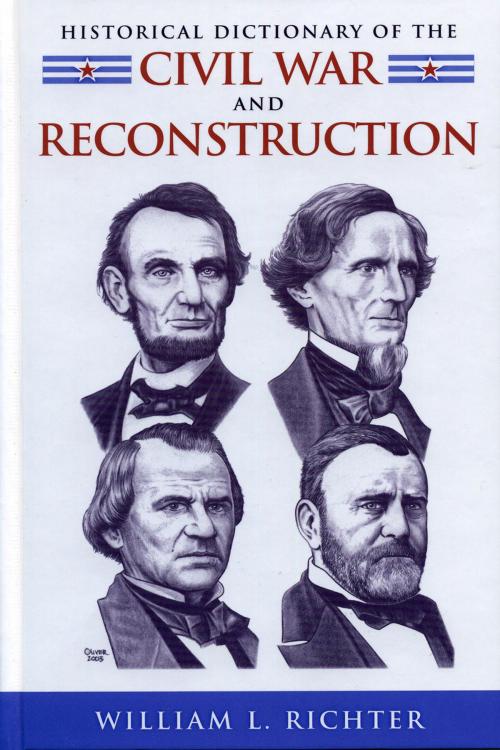Historical Dictionary of the Civil War and Reconstruction
Nonfiction, History, Reference, Americas, United States, Civil War Period (1850-1877)| Author: | William L. Richter | ISBN: | 9780810865631 |
| Publisher: | Scarecrow Press | Publication: | May 17, 2004 |
| Imprint: | Scarecrow Press | Language: | English |
| Author: | William L. Richter |
| ISBN: | 9780810865631 |
| Publisher: | Scarecrow Press |
| Publication: | May 17, 2004 |
| Imprint: | Scarecrow Press |
| Language: | English |
The importance of the Civil War and Reconstruction in the history of the United States cannot be overstated. There was a very real possibility that the union could have been sundered, resulting in a very different American history, and probably, world history. But the union was held together by tough and determined leaders and by the economic muscle of the North. While not always a period to be proud of, it did have higher goals and compelling ends. This one-volume dictionary, with more than 800 entries covering the significant events, persons, politics, and economic and social themes in the U.S. Civil War and Reconstruction, is a research tool for all levels of readers from high school and up. The extensive chronology, introductory essay, dictionary entries, and comprehensive bibliography introduce and lead the reader through the military and non-military actions of one of the most pivotal events in American history. Substantial coverage is given to the time that followed the Civil War: Reconstruction. This was a period construed in many different ways by the individuals involved, many of whom had little concern for the impact of their acts on others, and even fewer who were interested in the plight of the newly enfranchised blacks, for whom the war had supposedly been fought. While the states were once again 'united,' many of the postwar efforts divided different segments of the population and failed to achieve their goals in an era too often remembered for carpetbaggers and scalawags, and Congressional imbroglios and incompetent government. No matter how one looks at it, the Civil War continues to affect the politics, constitutionalism, and societal norms of the United States in an irrevocable way, and it probably always will. It was a very personal war, not fought by machines, but by men, affecting countless Americans who have one or more Civil War veterans hidden in their family trees. It's a war modern enough to be relevant to today's military interests, yet gentlemanly enough to be the last of the great romantic wars.
The importance of the Civil War and Reconstruction in the history of the United States cannot be overstated. There was a very real possibility that the union could have been sundered, resulting in a very different American history, and probably, world history. But the union was held together by tough and determined leaders and by the economic muscle of the North. While not always a period to be proud of, it did have higher goals and compelling ends. This one-volume dictionary, with more than 800 entries covering the significant events, persons, politics, and economic and social themes in the U.S. Civil War and Reconstruction, is a research tool for all levels of readers from high school and up. The extensive chronology, introductory essay, dictionary entries, and comprehensive bibliography introduce and lead the reader through the military and non-military actions of one of the most pivotal events in American history. Substantial coverage is given to the time that followed the Civil War: Reconstruction. This was a period construed in many different ways by the individuals involved, many of whom had little concern for the impact of their acts on others, and even fewer who were interested in the plight of the newly enfranchised blacks, for whom the war had supposedly been fought. While the states were once again 'united,' many of the postwar efforts divided different segments of the population and failed to achieve their goals in an era too often remembered for carpetbaggers and scalawags, and Congressional imbroglios and incompetent government. No matter how one looks at it, the Civil War continues to affect the politics, constitutionalism, and societal norms of the United States in an irrevocable way, and it probably always will. It was a very personal war, not fought by machines, but by men, affecting countless Americans who have one or more Civil War veterans hidden in their family trees. It's a war modern enough to be relevant to today's military interests, yet gentlemanly enough to be the last of the great romantic wars.















